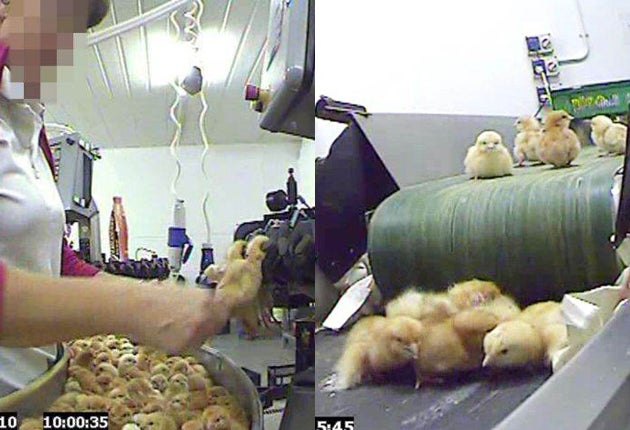Hatched, discarded, gassed: What happens to male chicks in the UK
Male chicks are culled because they do not lay eggs

On Wednesday, it was reported that Britain has a shortage of 'chick-sexers' - a job with a salary of £40,000.
The lack of people lining up for the role of dividing newly hatched chicks into males and females might have something to do with having to send all male chicks to be gassed to death.
Unlike female chicks, males from egg-laying hens do not produce eggs and are instead culled and used as feed for reptiles and other animals.
This culling process is not something consumers can avoid either. Killing male chicks happens regardless of whether the egg is produced in a free range system or from a caged battery hen.
A spokesman from the British Egg Information Service (BEIS) told The Independent: “They are culled almost immediately, so at a day old, they are humanely gassed. In some other countries this is not the case but it always is in the UK. It is the only method used.”
He said the birds are not used for meat because they do not grow fast enough.
Undercover filming by an animal welfare group in 2010 claimed to show some chicks being thrown into macerating machines after being sexed on a conveyor belt. A macerator kills animals instantly.

Instantaneous mechanical destruction (maceration) is listed as an approved method of culling chicks, poultry and ducklings by the RSPCA under its welfare standards.
Under its requirements, chicks should be killed within 15 minutes of hatching.
But a BEIS spokesman insisted male chicks are never killed by macerators. “All plants have to have macerator by law but they aren’t used for culling,” he said. “They are always humanely gassed.”
He said the practice of culling male chicks has been in place “as long as the industry has been there”.
Female chicks may survive culling but they will have their beaks trimmed, a process BEIS said was to ensure they "did not peck at each other and to stop cannibalism".
A spokesperson for Animal Aid, a British animal rights organisation, condemned male chicks being killed at just a day old as “truly appalling”.
The spokesman said: “That their few short hours of life are ended in a gas chamber or minced alive in an industrial macerator is beyond cruel.
"Consumers should be aware that this is what they are paying for when they buy eggs, regardless of whether they are from caged or free range hens.”
Join our commenting forum
Join thought-provoking conversations, follow other Independent readers and see their replies
Comments
Bookmark popover
Removed from bookmarks